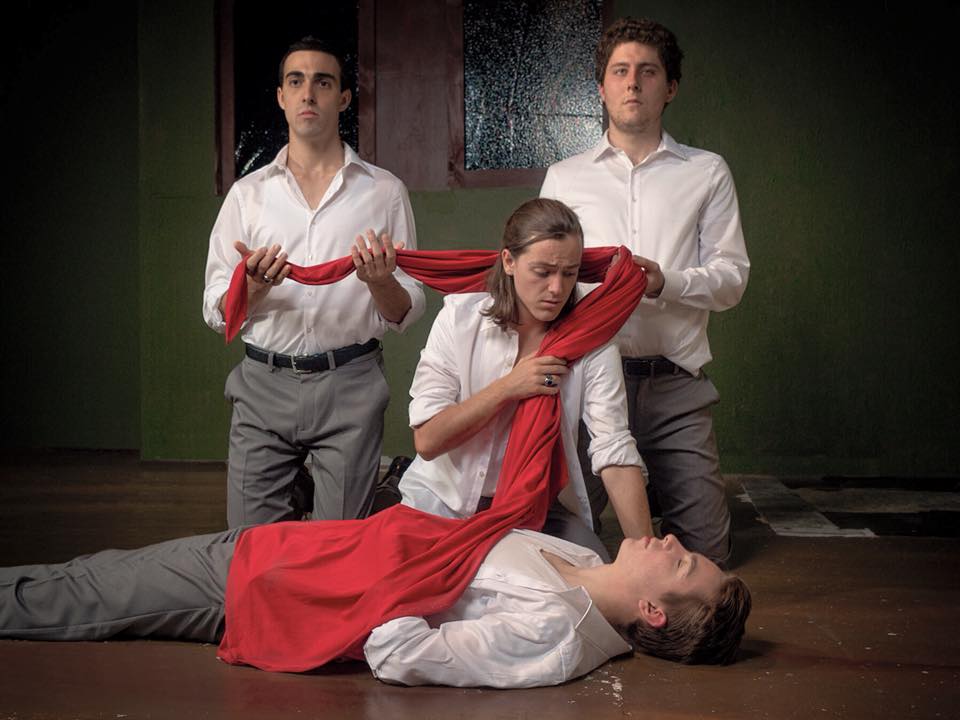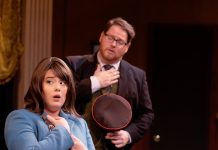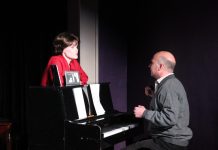Paula Vogel facetiously called Othello “a play about a handkerchief,” but Shakespeare’s R & J, Joe Calarco’s all-male reconception of the Bard’s most famous love story now being presented by the Vagabond Players, really is a play about a bolt of red cloth. Thanks to choreography by Jennifer M. Spieler that transforms her cast into the earthbound equivalent of Cirque du Soleil aerialists, the cloth comes to represent everything from a vial of poison to a suicide’s dagger, and from the two rapiers in a duel to the blood those weapons spill.

Fundamentally, of course, it symbolizes death, or at least the threat of it that hangs over the plot like a pall. This is most stunningly evident in its simplest use, as the bedsheet on Romeo and Juliet’s wedding night, where it alternately covers them like a shroud and is borne aloft like a sail, as if buoyed by their breath during lovemaking.
Calarco evidently believes that the newfound passion of these star-crossed lovers – who in his reimagining are students mounting a secret impromptu staging of Romeo and Juliet at a militarily regimented Catholic boys’ school – is a defiant counterforce to death, whether it comes in the form of bodily mortality or the spirit-killing persecution of young gay men by institutionalized homophobia. Such an interpretation ignores the many indications in the original text that Shakespeare considered Romeo and Juliet’s reckless romance, for all its beauty, to be itself a fatal error sowing devastation in its wake.
Even if one accepts Calarco’s unambiguously affirmative reading, however, problems remain. Romeo and Juliet is the play that notoriously promised a mere “two hours’ traffic” on the stage, prompting generations of directors to rush their actors through the script in a vain attempt to beat the clock. Calarco actually does bring his version in on time, but only by drastic trimming, and the result is what another Shakespeare play might call “the most unkindest cut of all.”
Moreover, by reducing the cast to four players, the two actors not portraying the eponymous lovers are forced to switch between characters sympathetic to R & J and those who fiercely oppose them – sometimes literally at the drop of a hat. Worse, they’re occasionally called to drop character altogether, abruptly abandoning their apparent enthusiasm for the proceedings and reverting to their offstage personae as gay-bashing bullies, only to resume the play-acting again moments later with undiminished vigor. Despite the best efforts of Michael Bannigan, as the ringleader of the drama club, to motivate these pendulum swings, they often seem arbitrary, as if these boys are all fortune’s fools – or perhaps just Calarco’s.
The playwright’s conceit makes it all too easy to excuse – even demand – inadequate acting of the play-within-a-play, since these boys are allegedly not trained Shakespeareans, and so would not be expected to give polished performances. At the Vagabonds, several castmembers go up on their lines, employ counterproductive body language, even misread the characters’ intentions – and I’m not sure that’s always intentional. Still, I’d rate Conor Donahue as the most promising thespian, particularly when he’s capturing the doomed swagger of Mercutio, whereas Parker Damm strikes furthest from the mark, most regrettably by failing to make the Nurse funny.
But like the play on which it’s based, R & J lives or dies on the central couple’s ardor. Bannigan (as R) and Sam Cure (as J) are a physically mismatched couple, and so their onstage courtship has a certain charming awkwardness. They manage the kissing and simulated sex credibly enough as well, for which kudos are due to Jonathan Ezra Rubin, who doubles as Fight and Intimacy Director.
Nevertheless, I never quite believed that these two boys had fallen in love outside the charade of Shakespeare. Since Calarco seems to be depicting their offstage relationship as a genuine thwarted affection, rather than just the fleeting by-product of a Method acting exercise gone too far, as you might find yourself thinking it is here, that failure must be counted as a great woe – not as great as the tragedy of Romeo and Juliet, perhaps, but ’twill serve.
Running Time: Two hours, including one intermission.
Shakespeare’s R & J plays through September 30 at the Vagabond Players, 806 S. Broadway, in Baltimore, MD. For tickets, call the box office at 410-563-9135, or purchase online.




